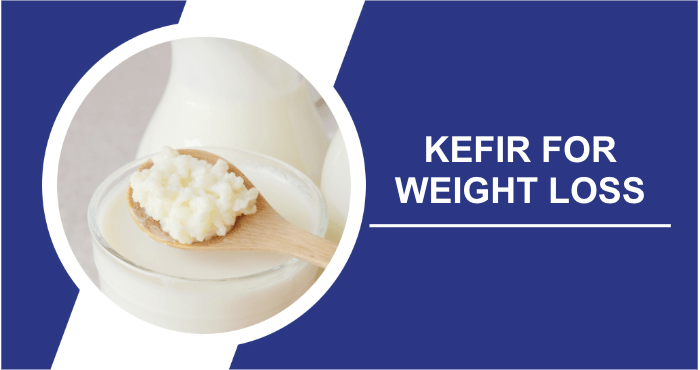If you’re trying to lose weight, consider adding kefir to your diet! Incorporating a couple of cups of kefir into your diet can offer you a protein option that aids in increasing your metabolism and promoting satiety, ultimately curbing the tendency to overindulge. Keep reading to learn how to shed unwanted weight with Kefir.
Reasons Why Kefir Is Beneficial For Weight Loss
- Helps control appetite with its high protein content
- Contains CLA, which aids in burning
- Enhances metabolic function
- Alleviates gastrointestinal discomfort
- Provides calcium for fat-burning
What Exactly Is Kefir and Where Does It Come From?
Kefir, a dairy beverage, has been cherished for centuries. According to legend, it first emerged in the Caucasus Mountains as a divine offering. This delectable potion is crafted by fermenting milk with grains that host a blend of bacteria and yeast affectionately referred to as SCOBY. Together, they collaborate in their enchanting process.
They turn ordinary milk into a creamy concoction with a slightly tangy, yoghurt-like taste. Kefir has long been valued for its benefits, thanks to its abundance of beneficial bacteria that support overall well-being. It’s a timeless drink that connects us to our ancestors who appreciated its health-promoting qualities.
What Are Some General Tips If I Want to Lose Weight?
Losing weight is a journey, and there is no one-size-fits-all approach. Begin by enjoying your meals and including a range of fruits, vegetables, lean proteins, and whole grains on your plate. Remember to be mindful of portion sizes, as they can sneak up on you! Stay hydrated by choosing water instead of sugary beverages.
Now let us discuss the importance of activity. Find an activity that doesn’t feel like a chore; you’ll be more motivated to stick with it. Don’t underestimate the power of a good night’s sleep. Aim for 7-9 hours of restful sleep. Above all, remember that this journey is about progress, not perfection. So be kind to yourself along the way!
Discover Why Kefir Is a Smart Choice for Weight Loss
Like other fermented foods, such as kimchi and kombucha, kefir is packed with nutrients and has many benefits for overall well-being. The probiotics in kefir can boost your metabolism and help you break down fat.
By including kefir in your diet, you can support a healthy gut microbiome that can alleviate issues like bloating, constipation, and digestive problems that may contribute to weight gain. Moreover, the combination of protein, vitamins and nutrients present in kefir can assist in regulating your appetite, making it easier to avoid overindulging. Furthermore, kefir is a fat option containing CLA (conjugated linoleic acid), a compound recognized for potentially aiding fat burning.
Kefir is an excellent source of dietary calcium, promoting strong and healthy bones while supporting weight loss through thermogenesis – the process by which fat is broken down.
A Rich Source of Protein
Protein plays a vital role in regulating our appetite. When we don’t consume protein, fiber and essential vitamins in our diets, we often experience increased hunger and are prone to overeating. Including kefir made from dairy products in your meals can be advantageous because it has around 100 calories per 6-ounce serving and offers an average of 4 grams of protein.
However, it’s important to be careful and avoid overconsumption, which can be counterproductive. Instead of choosing foods high in sugar or fat, adding kefir to your diet can help you feel fuller for longer. Kefir also contains CLA (conjugated linoleic acid), which has been linked to fat-burning properties.
Multiple Studies have provided evidence that the consumption of CLA can result in levels of proteins and enzymes in the body which specifically target fat deposits. This boost in metabolism aids in shrinking cells. Promoting cell death (apoptosis) within these cells ultimately supports weight loss objectives.
Boosts Metabolism
Kefir has been linked to an increased metabolic rate thanks to its vitamin K2, dietary calcium and probiotics. These three beneficial elements work together to increase metabolic activity, shrink cells and help eliminate excess weight and toxins from the body.
It’s worth mentioning that maintaining a gut microbiome is vital for managing body weight and metabolism. Incorporating this milk beverage into your daily dietary routine can serve as a valuable resource for regulating different bodily functions.
Relieves Digestive Issues
When our digestive system is stressed and out of balance, it can cause symptoms such as bloating, gas, inflammation, constipation and even hinder weight loss efforts. Adding kefir to your routine can restore balance to the gut microbiome and improve digestive processes. The probiotics found in kefir promote digestion, faster waste elimination, and improved appetite control.
Containing Fat Burning Dietary Calcium
Calcium in your diet is crucial for keeping your bones strong and managing body fat. Various studies involving animals, adult women, and adolescent girls have indicated that incorporating dairy products like kefir can be beneficial in weight management.
The calcium in kefir inhibits the production of calcitriol, a hormone that triggers the breakdown of cells in the body. In addition, dietary calcium helps to increase the metabolic rate through thermogenesis and reduce tissue.
How to Incorporate Kefir Into Your Weight Loss Journey
Adding 1 to 2 servings of kefir, each weighing around 8 ounces, to your routine can prove to be an uncomplicated and efficient approach to utilizing kefir as a component of your weight loss endeavors. Kefir, being a fat-fermented protein source, not only aids in suppressing appetite but also facilitates shedding those extra pounds.
Many people struggle with weight management due to imbalances in gut bacteria, overeating habits and irregular bowel movements. Consuming kefir can help regulate bowel movements, relieve constipation, improve digestion and prolong satiety.
How Kefir Can Aid in Losing Weight
When it comes to tackling issues like obesity, inflammation, and overeating, factors such as diet, hormonal imbalances, and the body’s metabolic rate play a role. Adding kefir to your food intake can positively impact your metabolism for several vital reasons. Specifically, the probiotics found in kefir influence how the body absorbs calories, contribute to maintaining a balance of gut bacteria, and help reduce inflammation.
Achieving and maintaining weight and optimal metabolic function is closely linked to the overall health of our digestive system. Incorporating fermented foods such as kefir into your weight loss programme can improve health and promote satiety, reducing the tendency to overeat.
Kefir also contains amounts of conjugated acid (CLA), a kind of fatty acid that scientists have studied for its potential advantages in promoting fat reduction and weight loss. Consuming foods that help maintain a functioning digestive system can enhance your metabolism and help remove toxins, waste, and extra weight.
The Goodness of Kefir for Your Health
Consider incorporating kefir into your meals not just for its potential weight loss advantages but also for its numerous proven health benefits. If you’re aiming to lose some weight while simultaneously improving your digestive system, here are some convincing reasons why you should make kefir a consistent component of your diet:
- Kefir has over 30 probiotics and beneficial micro-organisms that work wonders for your gut health, improving digestion and promoting efficiency.
- Consuming kefir over time can reduce symptoms of lactose intolerance, allowing you to enjoy dairy products without discomfort.
- Research has linked the inclusion of kefir in the diet to improved cholesterol levels and blood sugar regulation, which may contribute to better heart health and overall well-being.
- In addition to its potential as a weight loss aid, kefir is a source of essential nutrients such as calcium, K2, B2, B12, protein, phosphorus, and magnesium, which help nourish the body.
Kefir is a versatile food that can be savored in countless ways. Apart from enjoying it as a beverage, you can substitute kefir for milk in your cereal, blend it into smoothies or even incorporate it into your salad dressings. It’s exciting to explore the possibilities of kefir and how its tangy and slightly sour flavors elevate the tastiness of your dishes and snacks. If you have concerns about dairy products, kefir provides an alternative that offers comparable nutritional advantages.
Let me tell you, dairy-based kefir isn’t the only nutritional powerhouse out there! Water kefir actually has some antioxidant properties. Rather than relying on milk from cows or goats, water kefir is made by fermenting sugar, water and kefir grains together. While many people prefer milk-based kefir because it contains a range of microorganisms and probiotics, both types of kefir have significant health benefits, such as aiding weight loss and supporting gut health.
Who Is Kefir Best Suited for Weight Loss?
Kefir, the probiotic-rich beverage, can be a valuable ally in your quest for weight loss. It doesn’t have any preferences when it comes to its enthusiasts. Nearly everyone can savor it. However, it’s particularly beneficial if you’re aiming to shed some pounds. Curious as to why. Well, kefir is a calorie—and protein-rich option that can contribute to longer-lasting satiety.
The gut-friendly probiotics in kefir can aid digestion and boost your metabolism. So whether you’re a kefir enthusiast or just curious about this fermented treat, kefir could be your secret weapon in the battle against unwanted weight.
Are There Any Good Alternatives to Kefir?
If you’re not a fan of Kefir, tasty alternatives are available. Greek yogurt is a choice packed with protein and is beneficial for maintaining a healthy gut. If you prefer dairy options, almond milk or coconut yogurt can be beautiful substitutes, each offering distinctive flavors.
Fermented foods such as kimchi and sauerkraut are choices that are packed with probiotics to aid digestion. And let’s not forget kombucha, a spicy and tangy drink that is both refreshing and beneficial for the gut. Ultimately, the key is to discover what works best for your taste buds and dietary preferences. So feel free to mix and match for a healthy diet!
Precautions
When incorporating kefir into your diet, it is crucial to remember that your body may require a period of adjustment. If you are utilizing kefir to aid in weight loss, you might encounter side effects shortly after consumption, including cramping, constipation, diarrhea, headaches, gas, and bloating.
This is because the digestive system needs time to adjust to the probiotics introduced by kefir. It’s worth noting that pregnant or breastfeeding women who consume pasteurised raw kefir do not experience any negative effects.
Once the gut microbiome achieves a balance, most people experience reduced digestive issues within 2 to 4 days of regularly consuming kefir. However, if you are currently taking medication for a condition, have had previous fungal or yeast infections, or possess a sensitive stomach, it is recommended that you exercise caution when incorporating kefir into your diet. It’s always best to consult with your doctor for advice in these circumstances.
Frequently Asked Questions
What exactly is kefir, and how can it assist in the process of losing weight?
Kefir is a beverage that can be prepared using dairy or dairy components and is enriched with beneficial probiotics. These probiotics enhance gut health by maintaining a well-balanced microbiome. A healthy gut promotes digestion and metabolism, aiding in weight loss efforts. Moreover, kefir provides an amount of protein that helps you feel satisfied for an extended period of time, ultimately reducing your overall calorie consumption and supporting your weight loss journey.
How should I include kefir in my diet to facilitate weight loss?
When incorporating kefir into your weight loss programme, it is recommended that you start with smaller portions and gradually increase your intake over time. This gradual approach allows your body to adjust to the probiotics in kefir, minimising the likelihood of digestive upset in the early stages. As you progress, monitor your body closely to ensure a smooth transition.
Are there any side effects associated with using kefir for weight loss?
It’s important to mention that a few individuals might face digestive issues when incorporating kefir into their weight loss regimen. These issues could include cramps, gas or bloating. Such discomfort usually arises as the body adapts to the probiotics found in kefir. The good news is that these side effects are temporary and typically subside within 2 to 4 days as your gut microbiome adjusts to the probiotics provided by kefir.
Are there types of kefir recommended for losing weight?
Both dairy—and water-based kefir can potentially help with weight loss. Many people prefer dairy kefir because it contains a wider range of probiotic strains. The diversity of probiotics in dairy kefir may improve gut health, which is closely linked to effective weight management.
Can pregnant women or those who are breastfeeding use kefir to lose weight?
Pasteurized kefir is typically deemed safe for nursing women. However, it’s crucial to consult with a healthcare provider before incorporating kefir into your diet, as everyone’s circumstances can differ. Your healthcare provider can provide guidance and ensure that consuming kefir aligns with your specific requirements and health concerns.
Conclusion
Incorporating kefir into a weight loss plan can be very beneficial. It is rich in probiotics and has the potential to improve gut health. Although there may be some initial digestive discomfort as the body adjusts to the probiotics, these problems usually disappear with use.
Kefir has the potential to enhance the equilibrium of the gut microbiome, which can affect digestion and potentially aid in weight management. However, Individuals with health concerns or those taking medication should seek advice from their doctor before incorporating kefir into their diet. When consumed in moderation and with a diet and regular exercise, kefir can be a supportive element in reaching weight loss objectives.
Resources
- Critical Reviews in Food Science and Nutrition. (2019). “Modern perspectives on the health benefits of kefir in next generation sequencing era: Improvement of the host gut microbiota.” Link.
- Kaur, H., Kaur, G. and Ali, S.F. (2022). “Dairy-Based Probiotic-Fermented Functional Foods: An Update on Their Health-Promoting Properties.” 8(9), pp.425–425. Link.
- The Physician and Sportsmedicine. (2015). “Proposed Role of Calcium and Dairy Food Components in Weight Management and Metabolic Health.” Link.
- Sender Herschorn and Cho, W.-K. (2017). “The Consumption of Dairy Products Is Associated with Reduced Risks of Obesity and Metabolic Syndrome in Korean Women but not in Men.” 9(6), pp.630–630. Link.
- Wadolowska, L., Ulewicz, N., Kamila Sobas, Justyna Weronika Wuenstel, Malgorzata Anna Slowinska, Niedzwiedzka, E. and Czlapka-Matyasik, M. (2018). “Dairy-Related Dietary Patterns, Dietary Calcium, Body Weight and Composition: A Study of Obesity in Polish Mothers and Daughters, the MODAF Project.” 10(1), pp.90–90. Link.
- Stavros Plessas, Chrysanthi Nouska, Ioanna Mantzourani, Yiannis Kourkoutas, Alexopoulos, A. and Bezirtzoglou, E. (2016). “Microbiological Exploration of Different Types of Kefir Grains.” 3(1), pp.1–1. Link.
- Muganti Rajah Kumar, Swee Keong Yeap, Han Chung Lee, Nurul Elyani Mohamad, Aziz, M., Khalid, M., Mas Jaffri Masarudin, Thean Chor Leow, Janna Ong Abdullah and Noorjahan Banu Alitheen (2021). “Selected Kefir Water from Malaysia Attenuates Hydrogen Peroxide-Induced Oxidative Stress by Upregulating Endogenous Antioxidant Levels in SH-SY5Y Neuroblastoma Cells.” 10(6), pp.940–940. Link.
Mark Willson, holding a Ph.D., functions as a psychotherapist in Washington, D.C. His specialized fields encompass addiction, anxiety, depression, as well as sexuality and interpersonal connections. Dr. Willson holds the distinction of being a diplomat for the American Board of Addiction and Anxiety, further serving as a certified counselor and addiction specialist.
Aside from his personal professional endeavors, Dr. Wilson has engaged in roles as an author, journalist, and creator within substantial medical documentary projects.
Isabella Clark, Ph.D., held the position of a professor within Emory University’s School of Medicine, working in the Department of Mental Health and Nutrition Science. Alongside this role, she served as a research associate affiliated with the National Research Center. Dr. Clark’s primary area of research centers on comprehending the mechanisms through which adverse social encounters, encompassing prolonged stress and traumatic exposure, contribute to a spectrum of detrimental mental health consequences and coexisting physical ailments like obesity. Her specific focus lies in unraveling the reasons behind the varying elevated susceptibility to stress-linked disorders between different genders.






